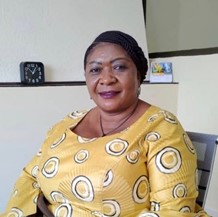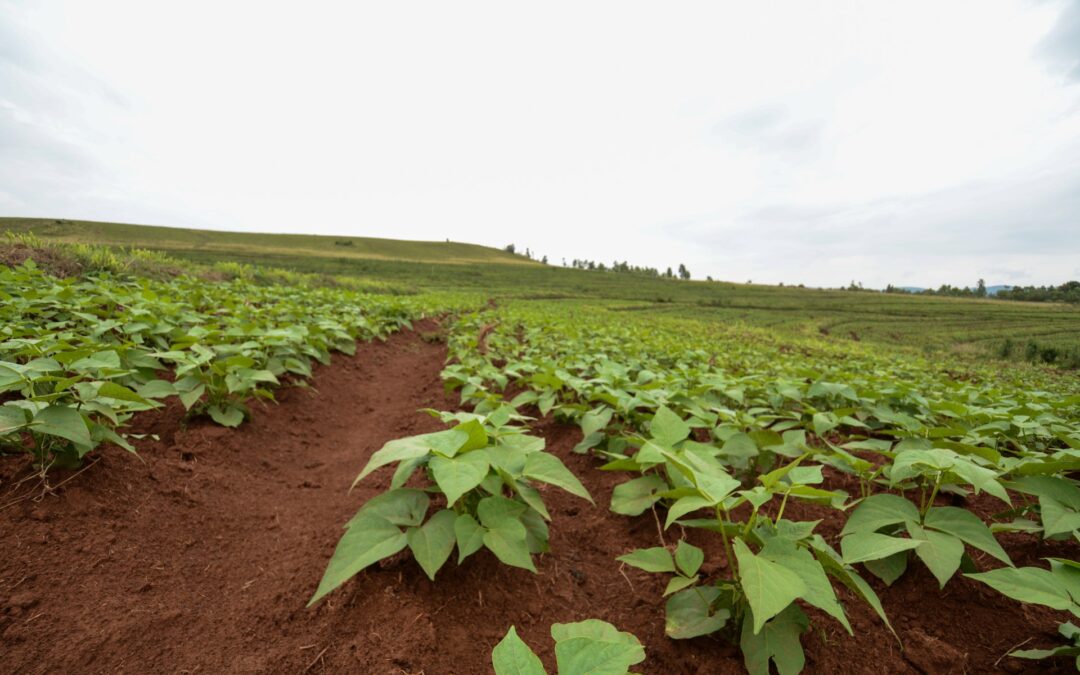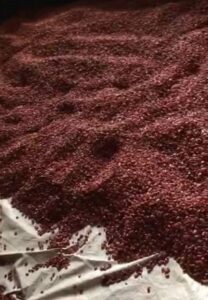By Napoleon Kajunju, Lydie Mulonda, Jean Claude Rubyogo, and Edited by Esther Nzuki
In September 2023, Solidarité des Femmes pour le Développement Intégral (SOFEDI), a women-led organization in South Kivu Province of the Democratic Republic of Congo (DRC), boldly ventured into bean farming under the dynamic leadership of Viviane SEBAHIRE MARAMUKE. Her vision, ambition, and unwavering belief in the potential of the bean sector fueled the organization’s commitment to empower women and transform the agricultural landscape. This is a story of determination, collaboration, and promise.
 Viviane SEBAHIRE MARAMUKE, the driving force behind SOFEDI, is a beacon of inspiration. Her active involvement and ambitious spirit have propelled the organization into the realm of agribusiness in the beans sector. With a firm belief that success is achievable, she spearheaded the initiative, guiding SOFEDI through the challenges and triumphs of the bean farming venture. To ensure the project’s success, Viviane collaborated with Action pour la Promotion et l’Accompagnement de la Femme Demunie (APAFED), a supplier of certified seed with a track record of excellence. APAFED, supported by the Pan-Africa Bean Research Alliance (PABRA) in previous interventions to multiply and sell seeds, brought valuable expertise to the partnership. This collaboration not only strengthened the supply chain but also contributed to the overall sustainability of the project.
Viviane SEBAHIRE MARAMUKE, the driving force behind SOFEDI, is a beacon of inspiration. Her active involvement and ambitious spirit have propelled the organization into the realm of agribusiness in the beans sector. With a firm belief that success is achievable, she spearheaded the initiative, guiding SOFEDI through the challenges and triumphs of the bean farming venture. To ensure the project’s success, Viviane collaborated with Action pour la Promotion et l’Accompagnement de la Femme Demunie (APAFED), a supplier of certified seed with a track record of excellence. APAFED, supported by the Pan-Africa Bean Research Alliance (PABRA) in previous interventions to multiply and sell seeds, brought valuable expertise to the partnership. This collaboration not only strengthened the supply chain but also contributed to the overall sustainability of the project.
In a strategic move, SOFEDI invested $580 to acquire 240 kg of certified bean seed of climate-resilient, farmer and consumer-preferred varieties (NABE 4 and HM21-7) released by the Institut National des Etudes et de Recherche Agronomiques through PABRA. The beans were then planted on 3 hectares in intercropping with maize. PABRA enhanced the enhanced pre and post-harvest bean management skills and knowledge for both APAFED and SOFEDI. This collaboration was not merely a transaction but a testament to the potential unlocked when organizations unite for a common goal. The involvement of APAFED and SOFEDI, enriched by PABRA’s support, underscored the transformative impact of such partnerships on local agricultural initiatives.
The venture, though initiated individually, quickly recognized the diversity among women within the community. Viviane, with her keen understanding of the local context, engaged 90 women, some of whom were landless and others organized within the Associations Villageoises d’Epargne et de Crédit (AVEC). The women, inspired by Viviane’s vision, embraced the opportunity to contribute to the venture by receiving small plots of land to also cultivate beans. This not only secured their households income and food but also empowered them to actively participate in the venture’s success which resulted in a successful harvest of 1800 kg of dry beans on 3 hectares, complemented by maize.
- Beans harvested by SOFEDI. Photo Credit Viviane Sebahire
As the journey unfolded, Viviane faced challenges head-on, from the initial seed purchase to planting, fencing, and production. The collaborative effort with APAFED ensured a steady supply of quality seeds, laying the foundation for the project’s prosperity. However, APAFED is not the sole group involved in seed production and supply in South Kivu. Other actors in the seed sector have received support from PABRA. Agri-force and Groupe Milima are among them, supplying agro-inputs and certified bean seeds to farmers. With PABRA’s support, they are implementing an approach encouraging farmers to purchase seeds rather than waiting for free and often poor-quality seeds distributed by some emergency interventions. This approach is poised to break the cycle of low productivity and competitiveness caused by the free seeds provided by NGOs and other interventions. The mindset of farmers regarding seed purchase must change, and the step taken by SOFEDI is a demonstration that changing the paradigm is possible.
The story of SOFEDI is not solely about farming beans; it is a narrative of empowerment, resilience, and promise. Women’s leadership, exemplified by Viviane, coupled with collaboration with seed multipliers supported by PABRA, paints a picture of a brighter future for agribusiness in the bean sector. It is heartening to witness that, with the support of such initiatives, farmers now have the means to purchase quality seeds and engage in serious agribusiness, laying the groundwork for sustainable growth and prosperity in the Democratic Republic of Congo. Gender integration remains a core aspect of this new approach, with men actively participating in tasks such as bean shoveling during the harvest, complementing women’s roles. Most of PABRA’s partners, including SARCAF or Rikolto, like SOFEDI, recognize the importance of childcare for women and the community, ensuring the provision of daycare services and meals for women with children, reinforcing the organization’s commitment to inclusivity.
As PABRA launched the Beans For Women Empowerment (B4WE) Project funded by Global Affairs Canada, SOFEDI’s journey became an inspiration. It showcased the potential for strengthening gender equality, agency in decision-making, and resource rights of women and girls in conflict-prone provinces. The success of SOFEDI and seed multipliers trained by PABRA becomes a model, illustrating how such initiatives provide the means for farmers to purchase quality seeds, fostering sustainable growth and prosperity in the Democratic Republic of Congo. The bean harvest has become a symbol of possibilities and potential, promising a future where women in the bean sector stand empowered.



